|
|
---
|
|
|
|
|
|
Tag: ["🥉", "🇦🇫", "🚲"]
|
|
|
Date: 2024-11-12
|
|
|
DocType: "WebClipping"
|
|
|
Hierarchy:
|
|
|
TimeStamp: 2024-11-12
|
|
|
Link: https://www.bicycling.com/culture/a62503930/afghanistan-cyclist-evacuation-taliban-us-troop-withdrawal/
|
|
|
location:
|
|
|
CollapseMetaTable: true
|
|
|
|
|
|
---
|
|
|
|
|
|
Parent:: [[@News|News]]
|
|
|
Read:: 🟥
|
|
|
|
|
|
---
|
|
|
|
|
|
 
|
|
|
|
|
|
```button
|
|
|
name Save
|
|
|
type command
|
|
|
action Save current file
|
|
|
id Save
|
|
|
```
|
|
|
^button-TheAlchemistsNSave
|
|
|
|
|
|
 
|
|
|
|
|
|
# The Alchemists
|
|
|
|
|
|
## PART I: PIONEERS
|
|
|
|
|
|
The day before the Taliban trammeled her freedom, a young woman went for a bike ride.
|
|
|
|
|
|
She wore pants and a long-sleeved shirt under a sky-blue cycling [jersey](https://www.bicycling.com/skills-tips/a32980316/how-to-buy-a-cycling-jersey/). Her ponytail flew behind her like a flag, free of the hijab she usually wore tucked into her helmet. Her smile was shy but also bold, with a pop of red lipstick.
|
|
|
|
|
|
Reihana Mohammadi was 18 years old, a new member of the Afghan National Cycling Team. She lived and trained in Bamyan, a small and peaceful city in the rugged heart of Afghanistan. On this 20-mile ride she was thinking about her next big [race](https://www.bicycling.com/training/a20027893/road-racing-101-what-you-need-to-know/), three weeks away in Pakistan. She hoped to raise her country’s flag in her first international victory.
|
|
|
|
|
|
Riding a team-issue [mountain bike](https://www.bicycling.com/bikes-gear/mountain-bike/a20048810/best-mountain-bikes/), Reihana sailed down a two-lane ribbon of road, through a desert canyon with crumbling walls. Behind her, in a valley framed by peaks, were the ancient cliffs of Bamyan. The city was known for the Bamyan Buddhas, two statues carved into a cliff.
|
|
|
|
|
|
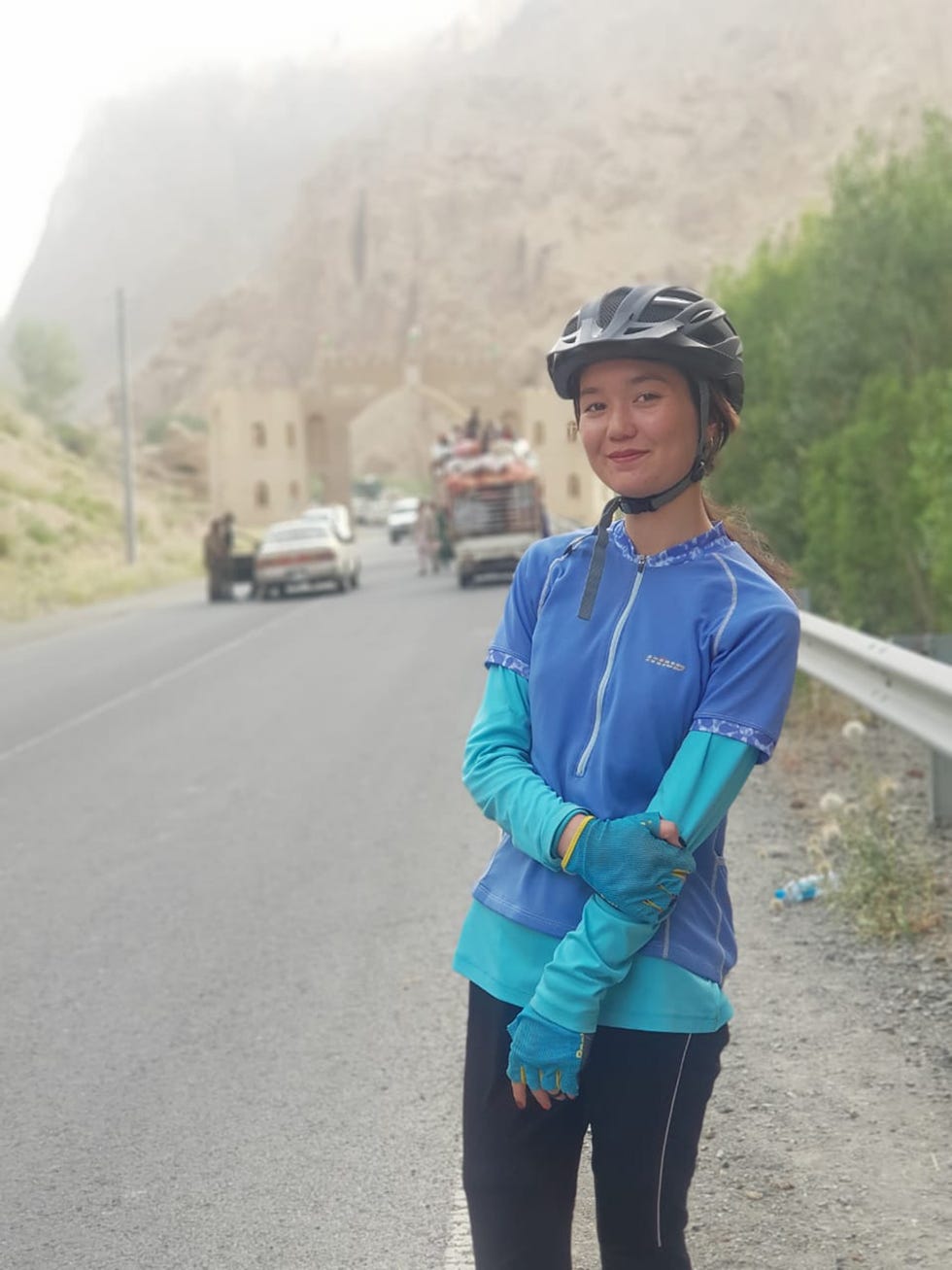
|
|
|
|
|
|
Courtesy Reihana Mohammadi
|
|
|
|
|
|
Reihana Mohammadi during her last ride in Bamyan on August 14, 2021.
|
|
|
|
|
|
Created in the 6th century, these statues were older than Islam. One Buddha, regarded as male, was 18 stories tall and named Salsal, which means: Light shines through the universe. The other was smaller and older. Her name was Shahmama. Queen Mother.
|
|
|
|
|
|
Salsal and Shahmama had witnessed the rise and fall of one civilization after another. A Buddhist holy site. A Silk Road trading post. A Muslim city of 70,000 with a spirit of peace and progress. These Buddhas had watched over Bamyan for 1,500 years.
|
|
|
|
|
|
Now, in their place, were two voids.
|
|
|
|
|
|
In March 2001, the Taliban denounced the statues as “idols” and “gods of the infidels.” Militants from the Islamic fundamentalist group fired at the Buddhas with tanks and artillery. When that failed to fully destroy them, they used explosives, cheering as the statues crumbled in a cloud of dust and smoke.
|
|
|
|
|
|
Visible on every ride in Bamyan, the Buddha-voids echoed with absence, a constant reminder of what had been lost.
|
|
|
|
|
|
Pedaling out of the city, Reihana felt a mounting gravity. The air was still and heavy with dust. Such weather made the old women whisper: *Something bad is going to happen!* Locals were gathering in the streets, shoving parcels into trucks.
|
|
|
|
|
|
As Reihana rode past, some glanced up and noticed: A young woman pedaling a bicycle through the desert.
|
|
|
|
|
|
“You are crazy!” they cried in Dari, the native tongue. “The Taliban are very close!”
|
|
|
|
|
|
It was August 14, 2021. On TV screens across the world, maps of Afghanistan showed districts falling to the Taliban as the U.S. withdrew troops that had occupied the country since 2001. The center of the country was a bull’s-eye of freedom, and in that oasis was Bamyan. An island of peace in a sea of war, shrinking in the rising tide.
|
|
|
|
|
|
Outside Reihana’s central province, great cities were under siege—two dozen capitals had fallen in a matter of days. Diplomas and buildings were burning. Stray bullets were landing in children.
|
|
|
|
|
|
“They will kill you!” people on the roadside shouted. “Don’t go on!”
|
|
|
|
|
|
Reihana pedaled harder.
|
|
|
|
|
|
Her older sister, Zakia, had fought for this. This was a right that only a decade before did not exist in Afghanistan, one of the last countries in the world where women were forbidden to ride a bicycle. Born in 1994, Zakia Mohammadi was a teenager when she risked her life to challenge this cultural taboo. Her success was so public that death threats drove her out of her country in 2019; she has lived in Germany ever since.
|
|
|
|
|
|
Zakia’s absence created a vacuum that inspired the next generation. Reihana was one of its stars. The sisters were everything the Taliban hated: Hazaras, an ethnic minority persecuted by the Taliban. Shi’a Muslims, sworn enemies of the Sunni Taliban. Educated women with a mind of their own. Women who used bicycles to emancipate other women. They embodied the freedoms women had won in the 20 years since the Taliban were suppressed.
|
|
|
|
|
|
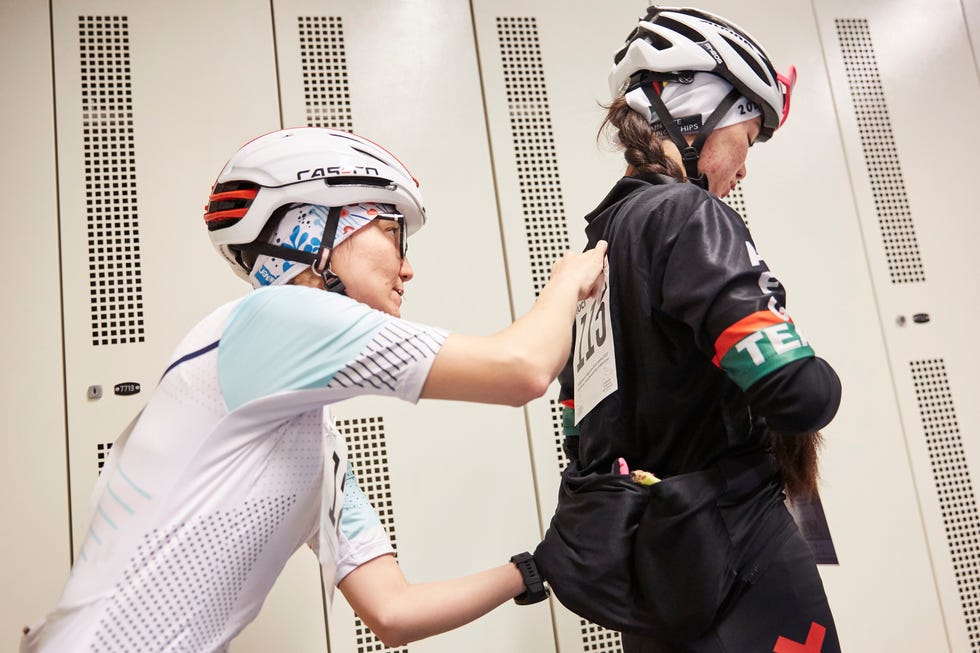
|
|
|
|
|
|
Djamila Grossman
|
|
|
|
|
|
Zakia Mohammadi helps attach Reihana’s bib before the Women’s Road Championships of Afghanistan in 2022. The event was held in Aigle, Switzerland, because of the Taliban’s return to power.
|
|
|
|
|
|
The Taliban considered the sisters—and all female athletes—as infidels who violated the Quran, because the clothes they wore to engage in sports allowed men to see the shape of their bodies.
|
|
|
|
|
|
Reihana rode through waves of dust and dread, training her mind on the coming race instead of the nearing Taliban. Her drive to compete won out over fear. She finished the ride and went home to the house she shared with her parents, older brother, James, and little sister, Hania. She fell asleep in her room, surrounded by trophies, medals, and ribbons.
|
|
|
|
|
|
The next morning, her uncle called with a warning: The Taliban were coming.
|
|
|
|
|
|
“Take nothing—just run,” her uncle said. “If they find you, they will kill you!”
|
|
|
|
|
|
Reihana darted around her room, filling her arms with papers that identified her as an athlete. In the backyard, she lit them on fire and watched her identity burn. Years of dreams and victories vanished in a plume of smoke.
|
|
|
|
|
|
Her father gathered documents while her mother packed water and snacks. They would drive four hours to Kabul, where they could stay with family and try to catch a flight out of the country. Some of their treasured possessions—bicycles, snowboards, trophies—would identify them as infidels and put their lives in danger. Reihana’s heart ached to leave her bike. Would she ever see it again? There wasn’t much time to wonder.
|
|
|
|
|
|
Taking nothing more than a backpack apiece, the family of five piled into the car and sped through the gates of Bamyan, past trucks full of Talib soldiers streaming in. Fighters dusty from battle rode in pairs on motorbikes, the passengers carrying rocket-propelled grenades slung over their shoulders.
|
|
|
|
|
|
In the backseat, Reihana hid her red lips behind a wisp of white scarf. Through the window, she scanned her city for any sign of resistance. Where were the Afghan soldiers? Where were the police?
|
|
|
|
|
|
As they drove past the police station, she saw that the Afghan flag, with its stripes of black and red and green, no longer flew over the building. In its place was the black-and-white Taliban flag.
|
|
|
|
|
|
It is over, she thought. It is finished.
|
|
|
|
|
|
Twenty years of rights and dreams and freedoms began to crumble.
|
|
|
|
|
|
> > The sisters embodied the freedoms women had won in the 20 years since the Taliban were suppressed.
|
|
|
|
|
|
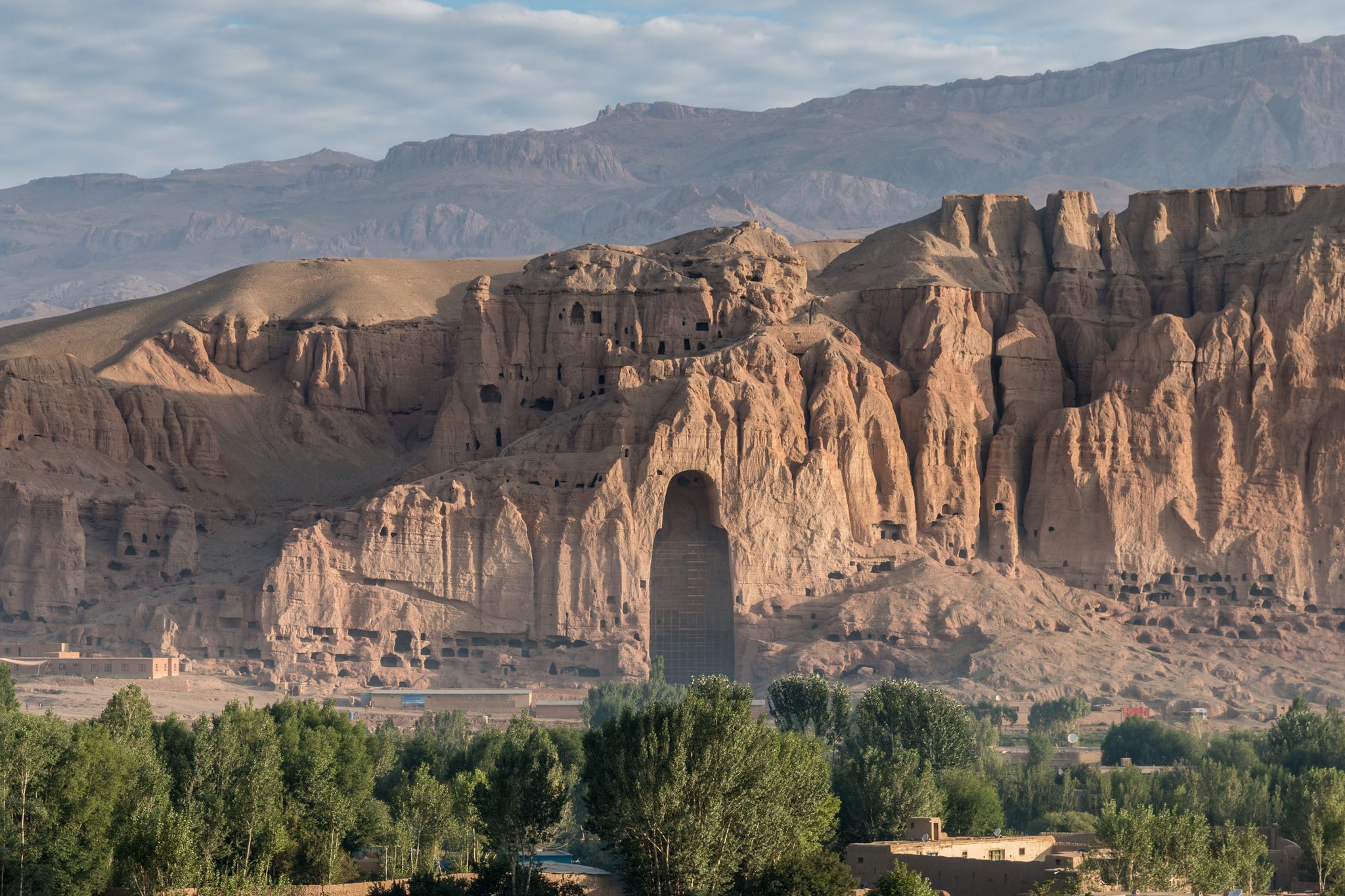
|
|
|
|
|
|
picassos//Getty Images
|
|
|
|
|
|
The larger of the two voids left after the Taliban destroyed the Bamyan Buddhas in 2001.
|
|
|
|
|
|
**The First Rides**
|
|
|
|
|
|
Zakia Mohammadi was born on the fourth of July in Iran. Her mother, then 16, was the daughter of Afghan refugees who had fled the rise of the Taliban in the 1990s. Her father, born in Afghanistan, had also grown up in Iran. Zakia, their first, was eight weeks early, so small and quiet that her mother said, “She didn’t even know how to cry.”
|
|
|
|
|
|
When Zakia was 5, her father gave her a little red bike and taught her how to ride. She burned laps around the family’s yard, but her parents didn’t think it was safe for a girl to ride in public. It wasn’t illegal in Iran. But it was unusual. A bit taboo. Some believed a bicycle seat could threaten a woman’s chastity.
|
|
|
|
|
|
In Iran, the family enjoyed luxuries they didn’t have in Afghanistan: good roads, nice schools that girls could attend, better infrastructure and order. Life in Iran was safer and, in many ways, easier. But people there yelled, “Afghani, why are you here? Go back to your own country!” That wasn’t freedom.
|
|
|
|
|
|
On September 11, 2001, al-Qaeda operatives hijacked commercial jets and turned them into weapons. The world watched twin towers collapse in Manhattan in a cloud of dust and smoke. A month later, U.S.-led international troops landed in Afghanistan—where the Taliban had provided sanctuary to al-Qaeda—to wage war on the terrorist group and its leader, Osama bin Laden. By late 2001 the Taliban were in retreat.
|
|
|
|
|
|
In 2003 Zakia’s parents felt it was safe to move back home to Afghanistan. Zakia was 10. By then she had a little brother named James, and a baby sister who cried a lot: Reihana.
|
|
|
|
|
|
Their father opened a bike shop in Bamyan. As a boy he’d played soccer and trained in kung fu. As a young adult he fell in love with downhill skiing. He didn’t yet view cycling as a sport. It was a cheap, fast, and reliable mode of transportation. For men.
|
|
|
|
|
|
Nine years later, when Zakia was 18, she was walking in Bamyan one day when she noticed something shocking: A young woman on a bike. Not training. Just getting from here to there. As if this were perfectly normal. Zakia flagged her down. That’s how Zakia met Zahra.
|
|
|
|
|
|
Zahra Hussaini had a fierce intensity that burned in dark, intelligent eyes framed by dark-rimmed glasses. She was 19, but she carried herself like someone much older. A college student, she’d started biking as a faster, easier way to get to class and work.
|
|
|
|
|
|
Most parents in Afghanistan never would have allowed this. But Zahra was an orphan. The youngest of three daughters, she’d been born in Iran to refugees who had left Afghanistan in the 1990s to get away from the Taliban. Zahra was 40 days old when her mother died. At age 2, she lost her father. Her older sister raised her unconventionally, cutting her hair short and encouraging her to enjoy the same freedoms as boys.
|
|
|
|
|
|
To earn money, the sisters wove carpets. Six-year-old Zahra begged to go to school. They made a deal: If Zahra wove so many rows a day, she was allowed. She thrived in and outside the classroom, a “playful and stubborn child” who loved playing soccer and sprinting through neighborhood alleys with local girls and boys.
|
|
|
|
|
|
One of the things the boys enjoyed most was riding bicycles. Zahra was 8 or 9 when she decided to teach herself. She borrowed an adult-sized bicycle and stretched to reach the pedals. She crashed a lot and scraped herself up and made her sisters worry.
|
|
|
|
|
|
“It seems my stubbornness helped me finally learn to ride it,” Zahra says.
|
|
|
|
|
|
When Zahra was 13, she and her sisters moved to Afghanistan. At 18 she moved to Bamyan, where she got a job producing radio shows on women’s rights and freedom of expression. She also worked for Habiba Sarābi, the first female governor of Bamyan, taking minutes in meetings with male officials. She enrolled at Bamyan University to study archaeology. On her 40-minute walk to class, she noticed boys zipping past her on bikes. What took her hours on foot took them minutes on wheels. It didn’t seem fair.
|
|
|
|
|
|
So Zahra got a bicycle.
|
|
|
|
|
|
She had never seen a woman riding a bike in Afghanistan. It was 2012—11 years after the Taliban had been driven into hiding by international troops. Some elders remembered Afghan women riding bicycles back in the ’60s, but hard evidence of that had been destroyed. The stories, however, endured.
|
|
|
|
|
|
After that first meeting in the streets of Bamyan, Zakia and Zahra forged a unique friendship. Zahra was more of a tomboy and an activist: fiercely outspoken, a scholar, a confident leader. Zakia, a natural athlete, was softer spoken and sweet-faced, with earnest eyes and a peacemaker’s strength. They shared a love for speed.
|
|
|
|
|
|
“We like to go fast,” Zakia says.
|
|
|
|
|
|
Other girls saw them and wanted to learn. Zakia and Zahra began teaching them. Soon, 10 girls were sharing one bike. Zakia’s father donated two more from his shop. Most of the roads in Bamyan were unpaved or riddled with potholes, so they practiced near the governor’s house, where the road was nice and smooth.
|
|
|
|
|
|
They weren’t racing, then. There was no team or club. They were simply girls teaching other girls a skill that expanded their world. Cycling was a way to go farther and faster, to school or a job or the market.
|
|
|
|
|
|
“Our wish was to go to and from places as we pleased,” Zahra says. “To have our own freedom.”
|
|
|
|
|
|
Riding made them feel “happy and scared,” Zahra says. Happy because freedom is joyful. Scared because of the fury their riding provoked in men. Boys hurled rocks. Old men sneered and yelled.
|
|
|
|
|
|
The mullahs—educated religious leaders—preached that what they were doing was wrong. Sinful. Obscene. A local Mosque posted signs: *Beware! Do not let your girls join this group.*
|
|
|
|
|
|
“The men, when they saw us, they thought it was shameful,” Zakia says. No bitterness in her voice. Just facts. “They decided it’s not good for us, because we are Muslim.”
|
|
|
|
|
|
They kept riding.
|
|
|
|
|
|
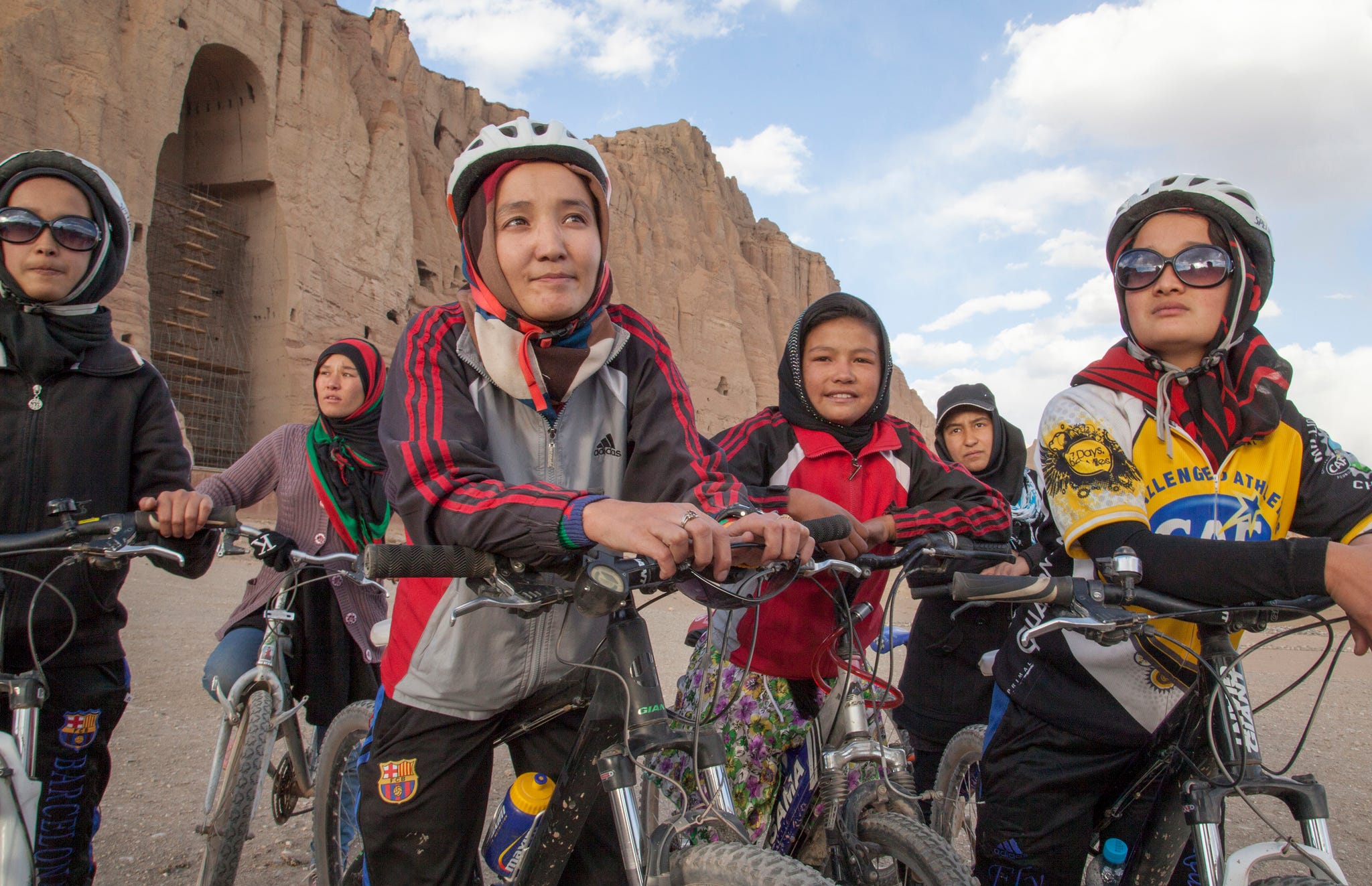
|
|
|
|
|
|
Jenny Nichols
|
|
|
|
|
|
Zakia, center left, during a ride with other women in 2014 in Bamyan.
|
|
|
|
|
|
**The First Race**
|
|
|
|
|
|
Some of the boys in Bamyan saw Zakia and Zahra, and instead of throwing stones, decided to join them. Soon girls and boys were riding together through Bamyan’s streets.
|
|
|
|
|
|
In 2013, the group heard about a ride that went from Kabul to Panjshir Province, about 75 miles northeast. Most of the girls stayed in Bamyan, but Zakia and Zahra decided to go. Zakia’s mother worried, because the road passed through a conservative town that didn’t like Hazaras. But Zakia reassured her: They’d be riding with boys from Bamyan, including Zakia’s younger brother.
|
|
|
|
|
|
The day of the ride was rainy and cold. Most of the riders wore ski masks, which covered their hair and faces. Zahra was usually fearless, but this day was an exception. “To tell you the truth, I was scared,” she says. Not of the ride, the risk of a crash, or getting harassed. She feared what it would mean if they failed.
|
|
|
|
|
|
“I was afraid that if Zakia or I got injured, it would affirm what others said about how girls shouldn’t be riding bikes,” she recalls. “I didn’t want to give them any evidence to support this.”
|
|
|
|
|
|
> > Riding made them feel “happy and scared.” Happy because freedom is joyful. Scared because of the fury it provoked in men.
|
|
|
|
|
|
The Bamyan boys supported the girls like domestiques, taking turns pulling and drafting. Zakia and Zahra finished the ride feeling confident and empowered. Instead of being heckled, they were given medals and celebrated as the only two female riders.
|
|
|
|
|
|
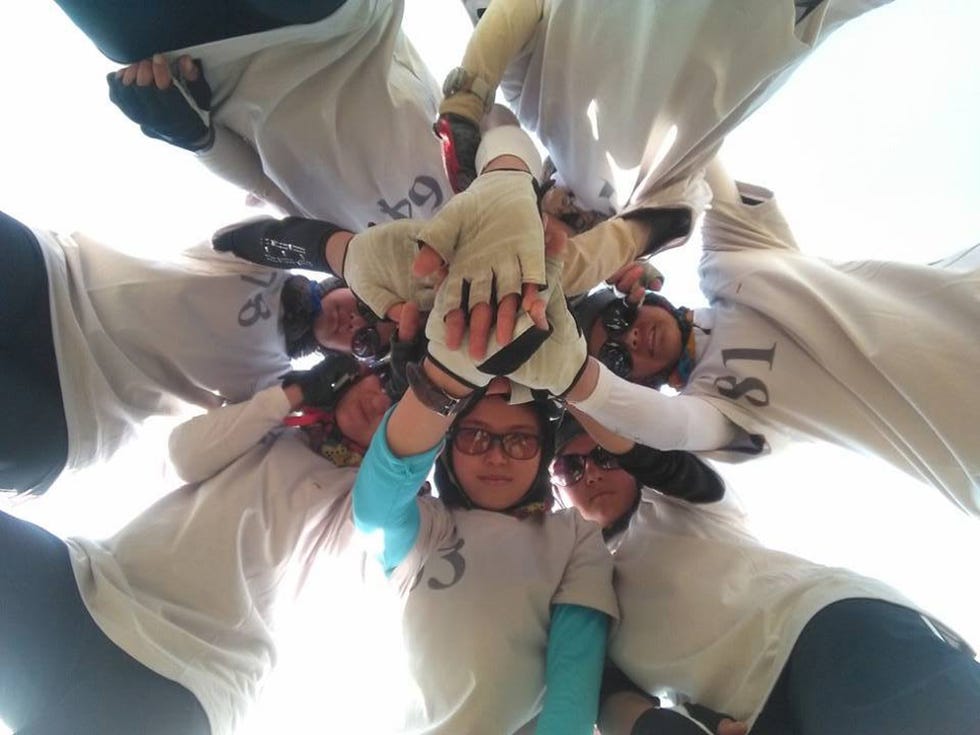
|
|
|
|
|
|
Courtesy Zahra Hussaini
|
|
|
|
|
|
Zahra (in blue sleeves) encircled by other members of her cycling group in 2013.
|
|
|
|
|
|
A few months later, Zakia and Zahra entered their first race, a road event in Bamyan. It was another cold day, and Zakia and Zahra pulled on their ski masks. They wheeled their mountain bikes—the only bikes they had—to the start.
|
|
|
|
|
|
As the race began, their knobby tires hummed on the asphalt as they jockeyed for position. None of their competitors knew they were racing against girls.
|
|
|
|
|
|
Zakia pulled ahead of the boys, feeling the rush and joy of speed, a bird uncaged in the wind. She crossed the finish line, caught her breath, and slowly peeled off her mask. When everyone saw her flushed face, they gasped.
|
|
|
|
|
|
A girl had raced—*and won?!*
|
|
|
|
|
|
On a mountain bike. An old one.
|
|
|
|
|
|
**The First Team**
|
|
|
|
|
|
In Bamyan, the community’s mind began to change when Zakia and Zahra started winning races. Girls begged their parents to let them learn how to ride, and some of their parents obliged. Men and boys started yelling *good* things at them for a change. Afghan men cheering Afghan women in sports was itself a revolution.
|
|
|
|
|
|
The mullahs were still outraged. They called the girls sinners and infidels. In every Afghan community, this council of elders holds a great deal of power; if anyone wants to do anything, it’s important to get their blessing.
|
|
|
|
|
|
When the mullahs heckled the girls in the streets, Zakia and Zahra stopped and tried to talk to them. It wasn’t the riding that bothered the mullahs. It was how they were riding—so brazen and proud, out in the open for all to see. In other sports, women competed in gendered courts or gyms walled off from men’s view. But cyclists trained in public, on roads.
|
|
|
|
|
|
It was also what they were wearing. Without a skirt or tunic, the shape of their bodies was visible. Even though they wore long sleeves and pants, the suggestion of a womanly silhouette might elicit sinful thoughts in men.
|
|
|
|
|
|
Zakia and Zahra explained that cycling wasn’t just a sport. It was a vehicle for “the freedom of travel.” Many girls had to walk two hours to get to school. If they could ride instead, maybe more girls could get an education. If women could ride to work, they could have access to more jobs.
|
|
|
|
|
|
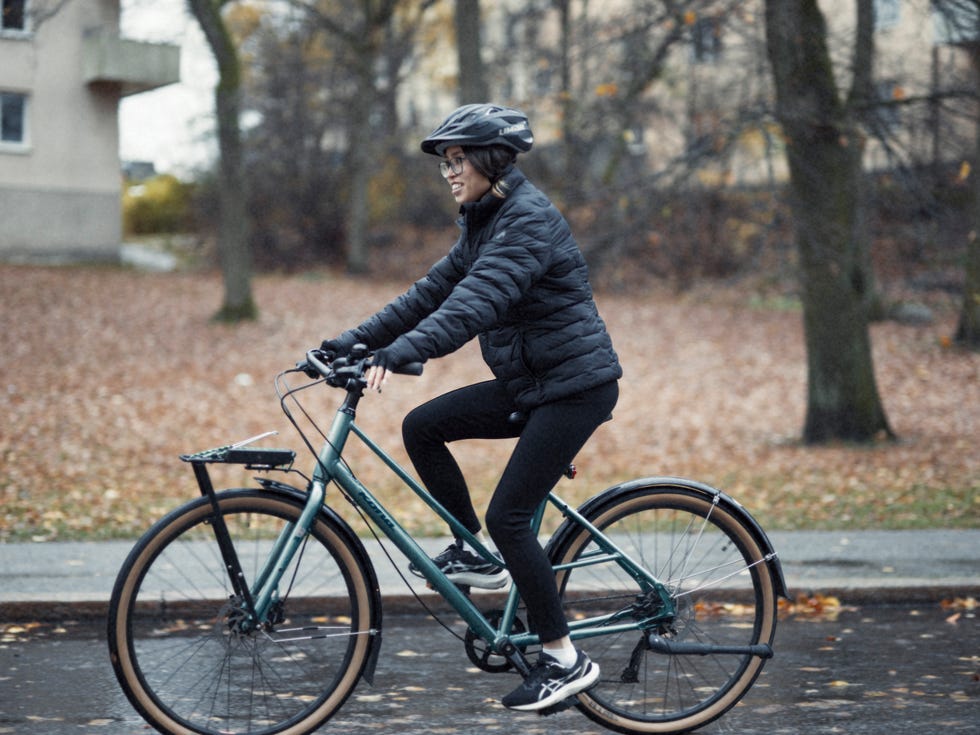
|
|
|
|
|
|
Felix Odell
|
|
|
|
|
|
Zahra Hussaini in Stockholm, Sweden, October 2022.
|
|
|
|
|
|
The mullahs nodded and conceded a little. It took many conversations, but eventually the mullahs grudgingly backed off. They never actually came out in support, but they finally stopped bringing it up.
|
|
|
|
|
|
Zakia and Zahra made T-shirts with their own slogan: *Haq Barai Radan*. Right to Ride.
|
|
|
|
|
|
In 2013, a year after they met, Zakia and Zahra founded a cycling club and team for girls and boys. Zahra, the archaeology student, came up with the name: Salsal & Shahmama. She also organized “A Night with Buddha,” an evening of cultural events to honor the legacy of the Buddhas. The statues no longer stood, but what they stood for did.
|
|
|
|
|
|
After hearing about Zakia and Zahra, an American woman came to Bamyan to meet them. A tall, blond, blue-eyed cyclist from Colorado, Shannon Galpin had traveled for years in Afghanistan. As a foreigner she was treated like an “honorary man,” allowed to travel alone, ride a bike, and talk as an equal with men.
|
|
|
|
|
|
Zakia and Zahra took Shannon on a ride through Bamyan, where locals stared and waved. They rode laps around fields, raced each other through the streets, and braked to a stop in front of the Buddha cliffs. A group of young smiling boys crowded around them, and a few girls crouched nearby. Zahra nodded at the kids and turned to Shannon.
|
|
|
|
|
|
“Girls deserve to have the same opportunities as boys,” Zahra says, “whether that’s education, or the right to ride a bike.”
|
|
|
|
|
|
Shannon saw that Zakia and Zahra’s bikes were old and janky. Two months later, she returned to Bamyan with eight new mountain bikes—for Zakia, Zahra, and six other girls.
|
|
|
|
|
|
They were part of a shipment of 65 bicycles donated by Liv Cycling for the Afghan National Team, a separate initiative Shannon was helping develop in Kabul. Founded and managed by men, this team was different from the Salsal & Shahmama club in Bamyan, a grassroots movement led by teenage girls.
|
|
|
|
|
|
Shannon tried to introduce the two groups, but it didn’t go well. The male coach of the national team was dismissive. Zakia and Zahra didn’t need “help” from some man to do what they were already doing on their own. So the two teams developed independently from each other. Shannon helped them both.
|
|
|
|
|
|
On August 8, 2014, Zakia and Zahra helped organize the Tour de Bamyan, the first coed cycling race in Afghanistan. In concert with nonprofit groups in Bamyan, they planned the event and mapped a course. They enlisted men and boys as officials, course marshals, and cheerleaders, making them allies in the process. Zakia’s father and brother were two of the Tour’s biggest supporters. “We wanted to make it an annual event,” Zahra says, “to demonstrate the equality and freedom in Bamyan, which could be a model for other cities.”
|
|
|
|
|
|
A year later, Reihana entered the Tour de Bamyan. Her first race. Feeling shy but also bold, she pushed herself through 20 kilometers of nerves and pain and glory. When she pedaled across the finish line—not first, but not last—she tasted victory.
|
|
|
|
|
|
During the podium ceremony, the riders gathered at a small cafe in front of the Buddha caves. Zahra called the crowd to attention and waved Reihana over.
|
|
|
|
|
|
“She’s the youngest participant and the youngest member of her team,” Zahra said as Reihana, who was 12, blushed and smiled. “She did well today. I am proud of her.”
|
|
|
|
|
|
Six years later, on her dusty training ride in August 2021, Reihana tried to focus on her upcoming race in Pakistan instead of the encroaching Taliban. She felt anxious, unsure what the future held. But she never imagined this would be her final ride in Afghanistan.
|
|
|
|
|
|
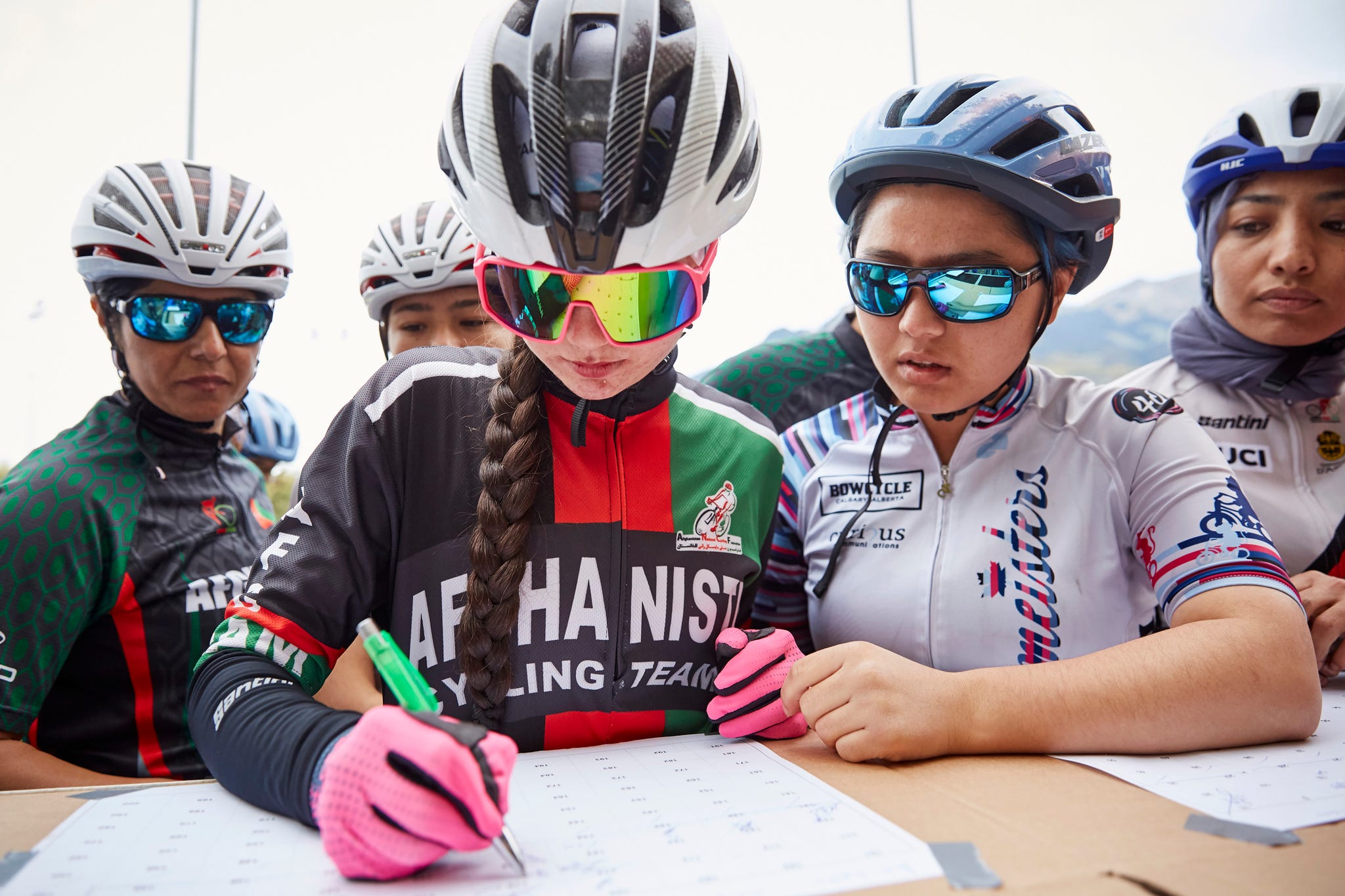
|
|
|
|
|
|
Djamila Grossman
|
|
|
|
|
|
Reihana signs in before the 2022 Women’s Road Championships of Afghanistan in Aigle, Switzerland.
|
|
|
|
|
|
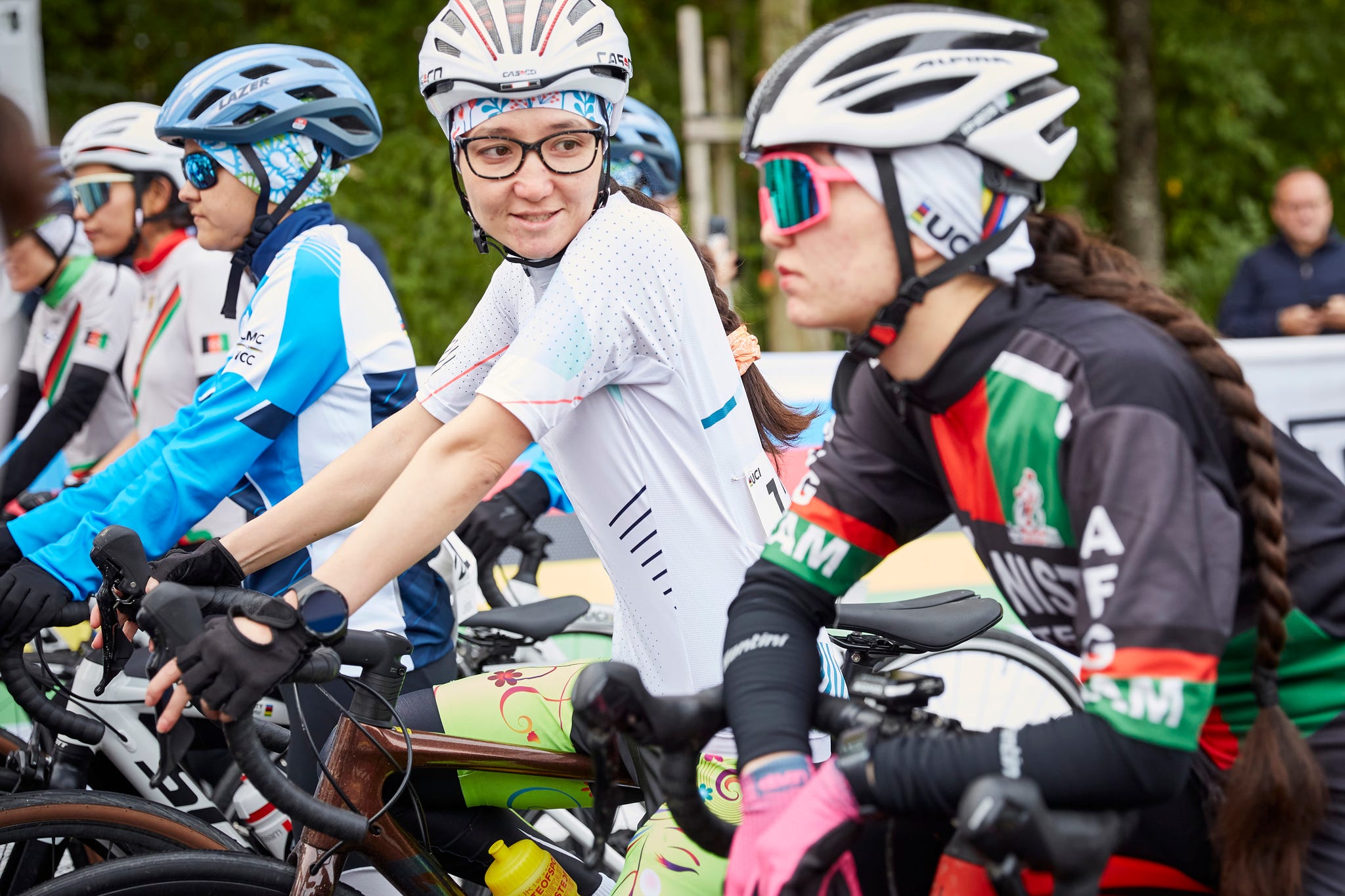
|
|
|
|
|
|
Djamila Grossman
|
|
|
|
|
|
Zakia and Reihana at the start of the Women’s Road Championships of Afghanistan.
|
|
|
|
|
|
Reihana was the daughter of a bike shop owner, heir to her sister’s legacy. Cycling was her birthright. It was the bedrock of her dreams: to race in the Tour de France Femmes, to compete in the Olympic Games, or maybe one day wear the rainbow stripes of a world champion.
|
|
|
|
|
|
After driving to Kabul, Reihana and her family, including James and Hania, locked themselves in the home of a relative. The house had a small yard with trees, and through them Reihana could see the stars. The Quran says Allah created the stars to help people navigate the depths of darkness. Reihana gazed up at them now, seeking comfort.
|
|
|
|
|
|
If she stayed, she would lose her freedom. The Taliban would forbid her to play sports, have a job, or go anywhere without a man. But if she left, she would lose her home and the life she loved. Either way, her dreams and freedoms would crumble.
|
|
|
|
|
|
My dreams, my achievements, my medals, she thought. Everything destroyed in one day.
|
|
|
|
|
|
Zakia, in Germany, reached out to Shannon Galpin.
|
|
|
|
|
|
> > If she stayed, she would lose her freedom. But if she left, she would lose her home and the life she loved.
|
|
|
|
|
|
## **PART II: REFUGEES**
|
|
|
|
|
|
In Scotland, Shannon’s phone was exploding with messages from Afghan girls and women.
|
|
|
|
|
|
*Please help us!*
|
|
|
|
|
|
She was living in Edinburgh, raising a teenage daughter as a single mom. Through years of work as an activist, Shannon knew how far Afghan women’s rights had come in two decades. Now she was watching it all unravel.
|
|
|
|
|
|
All across Afghanistan, female athletes were deleting social media accounts, burning photographs and certificates, digging holes to bury their trophies and medals. Destroying the evidence. Erasing their identities.
|
|
|
|
|
|
Their lives were in real danger. Nooria Tabesh, a member of the national handball team, had been gunned down in her home in April. Cyclists were at heightened risk because of the very nature of cycling.
|
|
|
|
|
|
“It’s the one sport that is intrinsically tied to women’s rights,” Shannon says. “It represents independent mobility.”
|
|
|
|
|
|
Shannon had zero experience with evacuations. But during eight years of work in Afghanistan, she had been smuggled in the trunk of a car down mine-riddled roads where the Taliban had burned police checkpoints. She had felt the blast of a suicide bomb shatter the windows of her guesthouse in Kabul. She wrote a list of people in “imminent danger,” adding Reihana and her family.
|
|
|
|
|
|
Such lists were forming all over the world. Created by governments, nonprofit groups, athletic federations, and individuals, evacuation lists were culled into flight manifests that served in place of plane tickets. In the desperation of triage, the lists were constantly changing.
|
|
|
|
|
|
As a member of the national team, outspoken and successful, Reihana was on many lists. But what about her little sister, brother, and parents? They had to leave together if they wanted to stay together.
|
|
|
|
|
|
Shannon had them on a U.S. State Department list, but they weren’t on a flight manifest—yet. She told them to be patient, to stay in hiding until they were called to board. The airport in Kabul was convulsing with panicked crowds. People were clinging to the bellies of jets accelerating down the runway. Bodies fell from the sky.
|
|
|
|
|
|
Reihana and her family couldn’t wait. Blocks from the airport, they found the streets choked by rivers of people and trucks filled with Taliban soldiers. So they ditched their car and were swept into the confluence. When they found the airport gate locked, the people amassed like water behind a dam.
|
|
|
|
|
|
Even if Reihana and her family could find a way through, they didn’t have a flight to board. They returned to the car, went back into hiding, and prepared to try again. Day after day, they tried and failed.
|
|
|
|
|
|
The crowds at the airport were impenetrable. Planes were taking flight with empty seats because passengers could not reach them. Outside the gate, a young mother—also a cyclist—clutched her little girl to her chest as a fog of tear gas swirled around them. Her toddler screamed as her face and body began to swell. Shannon’s phone lit up with her cry for help:
|
|
|
|
|
|
*If not today*
|
|
|
|
|
|
*And I can not cross the gate*
|
|
|
|
|
|
*I will suicide*
|
|
|
|
|
|
> > Their lives were in danger. Cycling is “the one sport that is intrinsically tied to women’s rights. It represents independent mobility.”
|
|
|
|
|
|
**Zahra**
|
|
|
|
|
|
In Kabul, the Taliban were everywhere—standing on tanks, swarming the streets, wielding Soviet-era guns and pounding on doors to find infidels. As the capital fell, the president fled his country.
|
|
|
|
|
|
Zahra was living in Kabul with her husband. She had a high-profile job as a human rights worker and an aide to a prominent female politician. Zahra worked to build the very things the Taliban wished to destroy.
|
|
|
|
|
|
It wasn’t safe to go home, so Zahra and her husband met at a friend’s house. In the living room, Zahra flipped through a stack of photos she’d brought with her. Snapshots with her husband at “A Night with Buddha.” Pictures of her riding with the girls in Bamyan. Portraits of the Salsal & Shahmama team lined up in crisp white jerseys. Unable to start a fire indoors, Zahra ripped up the photographs and drowned the shreds in a bucket of water.
|
|
|
|
|
|
Zahra and her husband had to leave before they were killed. After more than 10 trips in vain to the airport, they realized their only chance was to drive to a border crossing. But all the borders were closed. Pakistan. Tajikistan. Uzbekistan. Turkmenistan. Iran. Even if the crossings had been open, Zahra and her husband couldn’t cross without visas. Government offices were closed. The roads were a minefield of checkpoints.
|
|
|
|
|
|

|
|
|
|
|
|
Felix Odell
|
|
|
|
|
|
Zahra Hussaini in Stockholm, October 2022.
|
|
|
|
|
|
Late one night, Zahra and her husband boarded a bus to Kandahar, more than 300 miles southwest of Kabul. The birthplace of the Taliban and Afghanistan’s capital before 9/11, Kandahar was the city where, just days before, the Taliban had opened the doors of the prison to swell their ranks of insurgents.
|
|
|
|
|
|
This was dangerous Taliban country. But it was also close to a stretch of the border with Pakistan known to be “porous.”
|
|
|
|
|
|
Zahra’s bus was filled with colleagues from the human rights organization where she worked. Several times, the bus was stopped at Taliban checkpoints where men with guns climbed aboard and scanned the solemn faces. Seeing civilians, they let the bus pass.
|
|
|
|
|
|
Zahra and her husband spent the night in Kandahar, coordinating with smugglers who could help them cross the border into Pakistan. The next day, the border crossing in the town of Spin Boldak was churning with anxious crowds. Zahra wrapped her arms around her husband’s waist so they wouldn’t be forced apart.
|
|
|
|
|
|
At the checkpoint, the Pakistan border police asked for their papers. Zahra and her husband pulled out their passports, but they had no visas. Their passage was denied.
|
|
|
|
|
|
Would they have to go back to Kabul? Would the Taliban learn who they were and all the freedoms they had fought for?
|
|
|
|
|
|
Just then, for a fleeting moment, the border checkpoint was left unattended. Zahra’s husband grabbed her hand. Quickly, quietly, they slipped through.
|
|
|
|
|
|
On the other side, in Pakistan, they didn’t know where to go. They walked down the road for 20 minutes and encountered other Afghans gathering amid a cluster of cars.
|
|
|
|
|
|
Zahra and her husband climbed into a car with strangers and were driven to Quetta, a border town where her sister-in-law lived. They could hide out for a while. But they still weren’t safe. Quetta flew the Taliban flag.
|
|
|
|
|
|
**Reihana**
|
|
|
|
|
|
On August 26, Reihana and her family tried once more to reach the airport in Kabul. Again, they found themselves blocked by the crowds. They joined the masses outside Abbey Gate, the only airport gate still open.
|
|
|
|
|
|
Just before sunset, Reihana felt an explosion, a blast so loud it shook the ground and rattled the air in her chest. Babies were screaming, women were crying, and Reihana felt caught in the force of the crowd as everyone started to run.
|
|
|
|
|
|
“Don’t go! There was a bomb!” people shouted. “You will die!”
|
|
|
|
|
|
The crowd turned like a tide, and its current was strong. Reihana linked arms with Hania so her little sister wouldn’t be swept away. But the crush of people broke their grasp and Hania was swallowed up.
|
|
|
|
|
|
Reihana scanned the sea of people for her little sister’s eyes. All she saw were unfamiliar faces, warped with terror, streaked with blood, some attached to bodies so broken they were hauled through the streets in wheelbarrows.
|
|
|
|
|
|
Reihana and her brother found the nearest door and pounded. The door opened, and they were led into a private Pashtun home. Pashtuns are one of the country’s largest ethnic groups and have a history of violent oppression against Hazaras. But this Pashtun family offered them water, food, and a safe place to rest. Someone found Hania and brought her into the house. Reihana threw her arms around her little sister and wept.
|
|
|
|
|
|
The suicide bombing, claimed by ISIS, killed around 200 people, most of them Afghan civilians. Its plume of smoke rose like a warning flag, visible for miles.
|
|
|
|
|
|
In Germany, Zakia clung to her phone as a lifeline and to Shannon as a source of hope:
|
|
|
|
|
|
*Hi dear Shannon. Please help me and my family. All people are going to get out but my family is still in danger. Please help me.*
|
|
|
|
|
|
Shannon wrote back:
|
|
|
|
|
|
*The gates are closed. No one can get through. I have them on convoy and a plane. I am going to get them out.*
|
|
|
|
|
|
In Scotland, Shannon was sleeping two hours a night, clutching a phone that hemorrhaged cries for help. Plan after plan fell through. She had Reihana and her family on a flight manifest but needed a bus that could get them through the mob at the gate. Other buses had been circling the airport for days, unable to pass through. Thousands of Afghans cleared to leave were being left behind.
|
|
|
|
|
|
Shannon and an army of lawyers were working around the clock, across borders and time zones, to help them. Some were calling this a Digital Dunkirk, a nod to the “miracle” of World War II when hundreds of civilian boats evacuated 338,000 soldiers stranded on a beach in France.
|
|
|
|
|
|
But the window of opportunity was closing fast. Sweden, Spain, Canada, Germany, and Australia concluded their evacuation efforts. Britain stopped taking applications. The last American soldiers would depart in just four days.
|
|
|
|
|
|
On August 31, the day after the last American soldier departed, Zakia feared, like many Afghans, the evacuation was over. She texted Shannon:
|
|
|
|
|
|
*I’m scared that this program will stop and my family will stay in danger with the Taliban. Please help us, you’re our only hope.*
|
|
|
|
|
|
Five years before, in 2016, an Italian group tried to nominate the bicycle for the Nobel Peace Prize. An inanimate object was not eligible, so they nominated the Afghan national women’s team, which did not include Zahra and Zakia. To Shannon, this felt hollow. The national team was started and run by men. The Bamyan movement was a grassroots revolution—for women, by women.
|
|
|
|
|
|
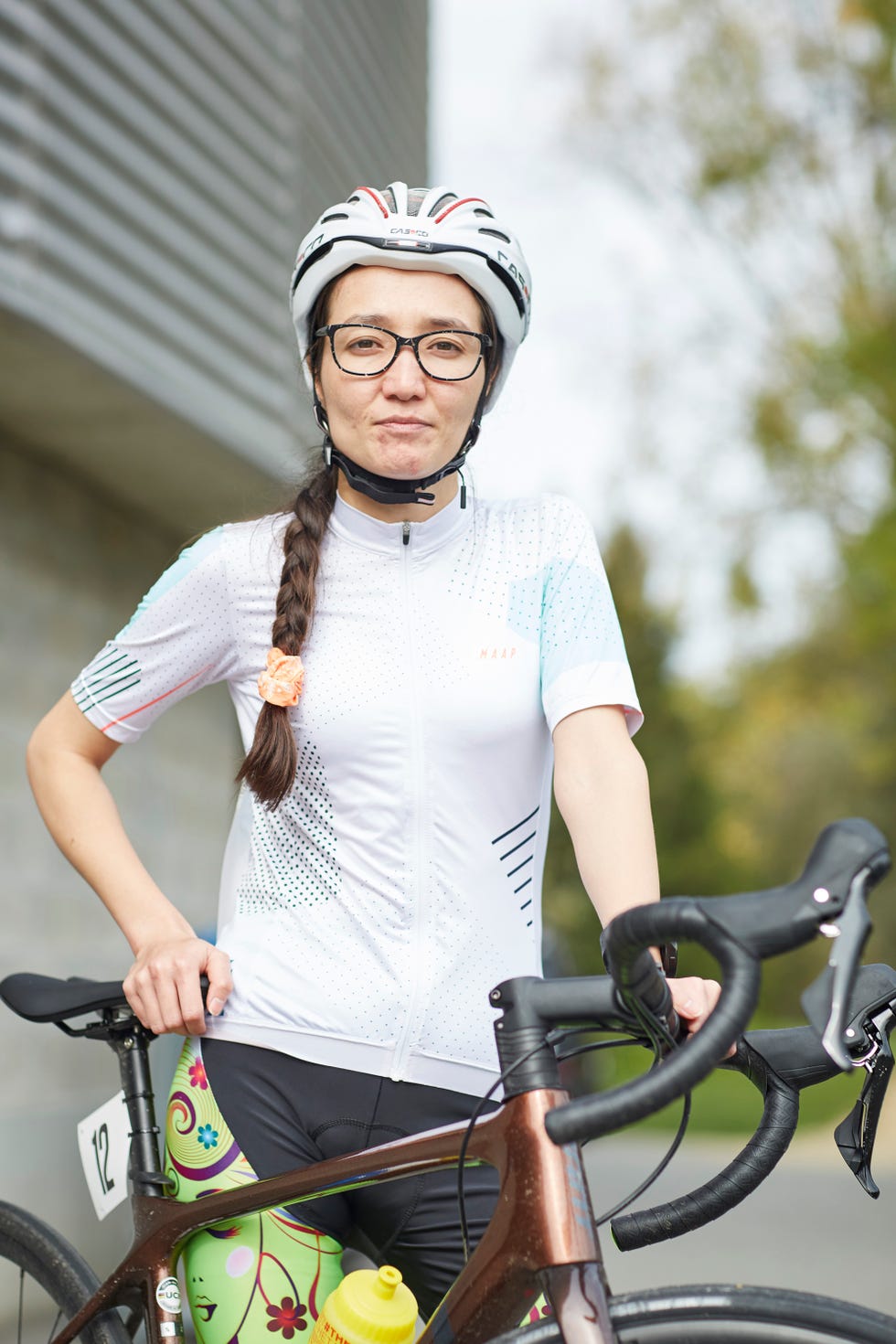
|
|
|
|
|
|
Djamila Grossman
|
|
|
|
|
|
Zakia after finishing the 2022 Women’s Road Championships of Afghanistan in Aigle, Switzerland.
|
|
|
|
|
|
Zahra and Zakia never raced on the national team, but they paved the way for others who did. Reihana and her brother, James, were later chosen as members.
|
|
|
|
|
|
In 2019, Zakia—who was equally gifted on snow skis—was one of three Afghan women chosen for a trip to Finland and Austria to be trained as downhill instructors.
|
|
|
|
|
|
On the last night of her trip, Zakia’s mother called her, sobbing.
|
|
|
|
|
|
“Please don’t come back to Afghanistan.”
|
|
|
|
|
|
“Why?”
|
|
|
|
|
|
“Somebody wants to kill you.”
|
|
|
|
|
|
> > The Taliban were everywhere—standing on tanks, wielding Soviet-era guns and pounding on doors to find infidels.
|
|
|
|
|
|
After the airport suicide bombing, Reihana and her family went on lockdown. Only her brother James would emerge to buy food in Kabul, dressed discreetly in shalwar kameez, traditional pants and long tunics. Some nights, the sound of gunfire echoed through the sky.
|
|
|
|
|
|
One day, Reihana’s phone rang with a call from an unfamiliar number. She declined, but the stranger kept calling. Finally, she answered.
|
|
|
|
|
|
“I know who you are,” a man’s voice said. “I know what you did and what you are doing. I know you’re still in Afghanistan.”
|
|
|
|
|
|
Reihana said nothing.
|
|
|
|
|
|
“It’s shameful for you to ride a bike,” he said. “If I find you, I will kill you.”
|
|
|
|
|
|
Oceans and continents away, Shannon and the lawyers tried to find another way out. The challenge lay in a minefield of international laws and rules.
|
|
|
|
|
|
As Shannon and her team pulled strings in the cat’s cradle of red tape, Reihana’s father made a trip to Bamyan to make some final arrangements. Reihana insisted on going. She needed to see her home once more, her bicycles, and the stars.
|
|
|
|
|
|
For the journey, Reihana wore a burka for the first time in her life. It was hot and claustrophobic, but it was also a brilliant cloak of invisibility. Concealed by this blue cloth prison, her red lips curved into an ironic smile: This instrument of oppression was hiding the body of an athlete.
|
|
|
|
|
|
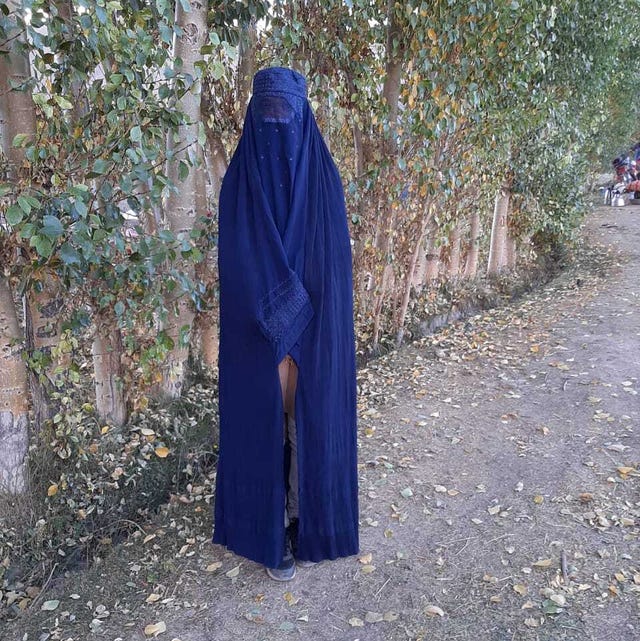
|
|
|
|
|
|
Courtesy Reihana Mohammad
|
|
|
|
|
|
Reihana wearing a burka for the first time in her life while visiting Bayman for the last time.
|
|
|
|
|
|
On October 20, Reihana and her family rose at 4:30 am on their final morning in Kabul. Drivers hired by Shannon shuttled them to a meeting point, where they boarded a bus that drove them to the Pakistan border. By late morning, they reached the Torkham border crossing at Khyber Pass.
|
|
|
|
|
|
Their papers were in perfect order. Reihana handed her passport to a Pakistani border official, who asked to see her face. She pulled back her hijab like a curtain and beamed. For once, she had forgotten her red lipstick.
|
|
|
|
|
|
“Are you happy to go to Pakistan?” the official asked.
|
|
|
|
|
|
“If it’s safer,” she said, “yes!”
|
|
|
|
|
|
Reihana and her family walked across the border. Sixty-six days had passed since they’d sped through the gates of Bamyan.
|
|
|
|
|
|
In Pakistan, their cell phones no longer worked. But they’d been given a code, a call-and-response, to identify the man who would transport them to a safe house.
|
|
|
|
|
|
“Red,” one of them said.
|
|
|
|
|
|
“Monkey,” came the reply.
|
|
|
|
|
|
They climbed into Red Monkey’s car.
|
|
|
|
|
|
A man whose name they would never know drove them 150 miles to Islamabad, where Shannon had arranged a safe house.
|
|
|
|
|
|
**Zahra**
|
|
|
|
|
|
Nine hundred miles southwest of Islamabad, Zahra and her husband were stranded in Quetta, the border town populated with Taliban. It wasn’t safe to leave the house.
|
|
|
|
|
|
Zahra had a letter from Sweden that offered an apartment in Stockholm and a two-year scholarship as a writer in residence within the International Cities of Refuge Network. If she and her husband could support themselves after two years, they could be permanent residents.
|
|
|
|
|
|
But she had to file the paperwork at a Swedish embassy—in person. The nearest embassy was in Islamabad, a 12-hour drive on roads patrolled by agents looking for Afghans without papers. Zahra wasn’t willing to risk deportation.
|
|
|
|
|
|
> > They live scattered across seven countries. They miss riding together in Bamyan, pressing against the wind.
|
|
|
|
|
|
An international network of women, coordinated by Shannon from Scotland, coalesced to solve the problem. Through an underground network of Hazara living in Pakistan, they appealed to the United Nations High Commissioner for Refugees. With papers proving her refugee status, Zahra couldn’t be deported. This gave her the security to make the trip to Islamabad.
|
|
|
|
|
|
At the Swedish embassy in Islamabad, Zahra sat for a photograph, rolled her fingerprints, and prepared to learn Swedish. Soon after, she learned that Zakia and her family were also in Islamabad. There wasn’t much time, but she knew she had to see them. She wanted to pay respects to Zakia and Reihana’s parents and thank them.
|
|
|
|
|
|
On a warm fall day in 2021, just days before flying to Sweden, Zahra and her husband took a taxi to the safe house where Reihana and her family were staying. Over lunch, they shared their stories of escape. In the common threads, they found comfort.
|
|
|
|
|
|
The future ahead was uncertain. The past was not even past. They didn’t know when or where or how they would see each other again. Zahra embraced Reihana one last time and said what mattered in the moment.
|
|
|
|
|
|
“I’m so happy that you are safe.”
|
|
|
|
|
|
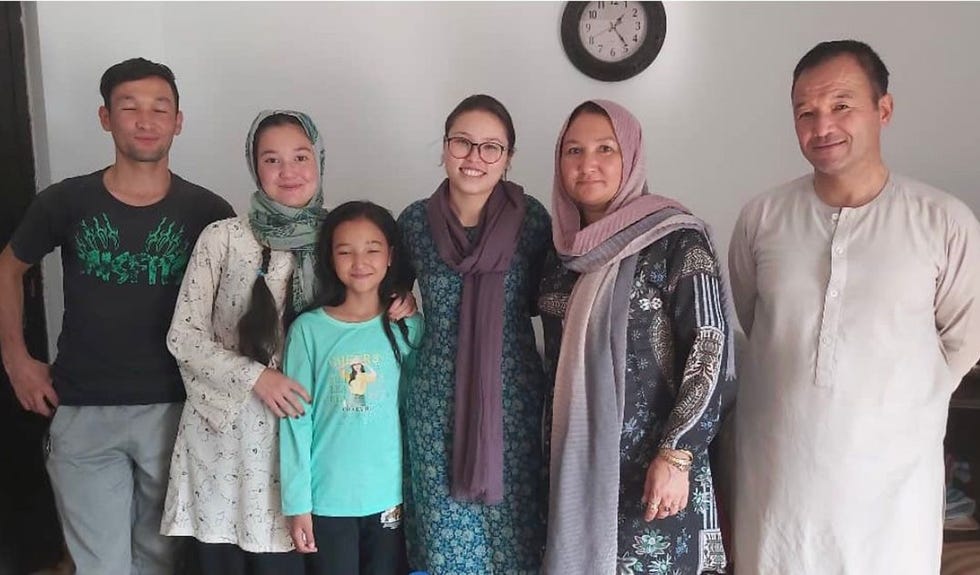
|
|
|
|
|
|
Courtesy Zahra Hussaini
|
|
|
|
|
|
Zahra traveled to Quetta, Pakistan, to visit Reihana and her family in their safe house on October 22, 2021. From left: James, Reihana, Hania, Zahra, and Reihana's parents.
|
|
|
|
|
|
## **EPILOGUE**
|
|
|
|
|
|
In March 2022, Zahra and her husband produced “A Night with Buddha” at a cultural center in Stockholm, where they live and work as permanent residents. It was an evening of dance, poetry, and discussion honoring Salsal & Shahmama.
|
|
|
|
|
|
Zahra thinks a lot about Afghanistan, and the women who have lost their freedoms. In Sweden she is safe, but she doesn’t feel free. She hopes that sharing her story will help people see a more nuanced Afghanistan. She dreams of a day when she and other women can return and ride. It’s been more than three years. So much has changed in such a short time, but she dreams of the possibility. Dreams are the stars without which the human soul is nothing more than night.
|
|
|
|
|
|
Shannon continued evacuating Afghans for more than a year, struggling to raise money when the war in Ukraine made Afghanistan old news. Getting Reihana and her family out was just one of 155 evacuations she managed directly. She credits a constellation of individuals—almost all of them women—that transcended international borders to help other women survive.
|
|
|
|
|
|
In November 2021, after a year in the Pakistan safe house, Reihana and her family landed in Germany. They were taken to a house in Penzberg, a small city in Bavaria where they would begin their new life as refugees.
|
|
|
|
|
|
A van pulled up to the house. Zakia, who had not seen her family in two years, emerged with wet eyes and open arms. Reunited at last, the sisters embraced. The tears were bittersweet.
|
|
|
|
|
|
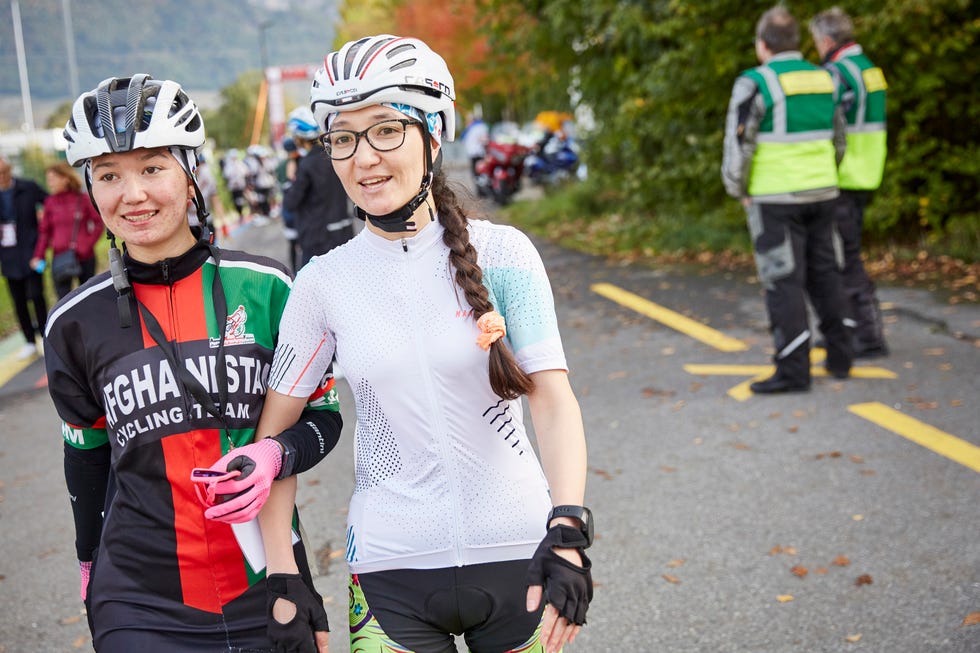
|
|
|
|
|
|
Djamila Grossman
|
|
|
|
|
|
Reihana, left, and Zakia after the 2022 Women’s Road Championships of Afghanistan.
|
|
|
|
|
|
Reihana and her family live together in Bavaria. Zakia, who lives in Munich, got engaged last year. Most weekends, she comes to visit. The German law firm that helped them relocate made [a 17-minute documentary film](https://youtu.be/QJdGxeD0K4A?si=fEMmILU8kSDXMEry) about their saga. A stranger in Switzerland, moved by the story, bought road bikes for Reihana and her brother.
|
|
|
|
|
|
Hania celebrated her 12th birthday shortly after moving to Germany. Her gift—from the German lawyer who secured their future—was a shiny new mountain bike.
|
|
|
|
|
|
Hania remembers her first race in Afghanistan, which was also her last race in Afghanistan. She was 11 years old, the littlest one. As Hania struggled up a steep hill, Reihana saw she was tired.
|
|
|
|
|
|
“Hania, it’s enough,” Reihana said. “You can stop.”
|
|
|
|
|
|
“No!” Hania shouted. “I will continue!”
|
|
|
|
|
|
Reihana no longer has the time or the heart to ride.
|
|
|
|
|
|
Now 21, she speaks the best English in her family, so she handles all the paperwork and meetings with German authorities. Her dreams of studying astronomy have been replaced by plans for a business degree. She is trying to get a good job, which is not easy for an Afghan refugee. Her brother, too, is searching for work. Her father works at a bike shop, and her mother is taking classes to learn German, math, and English.
|
|
|
|
|
|
“When I ride bikes now, I don’t feel as happy as I did in Bamyan,” she says. “It feels so different. I’m not that free.”
|
|
|
|
|
|
Reihana keeps in touch with her former teammates through texts and calls. They live scattered across seven countries. They miss riding together in Bamyan, pressing against the wind.
|
|
|
|
|
|
“We are in touch, but not like in Afghanistan,” Reihana says. “Life in foreign countries is really hard. Everybody is having mental issues. Depression.”
|
|
|
|
|
|
She misses her village, how people would wave when she pedaled by on a bicycle.
|
|
|
|
|
|
“In Afghanistan, we were so special.”
|
|
|
|
|
|
Some summer mornings, when she wakes up in her room to the first kiss of sunshine, Reihana feels a warm breeze through her window and feels like she is in Bamyan.
|
|
|
|
|
|
Then she remembers.
|
|
|
|
|
|
---
|
|
|
|
|
|
*Editor’s note: A network of women worked across borders and time zones to evacuate the cyclists in this story and over a hundred more. These include Hogan Lovells’ Pro Bono teams in three countries led by Yasmin Waljee in London, Ina Brock in Germany, and Amy Roma in Washington, D.C.; James Wilcox in the U.K.; Jalila Haider in Pakistan; Mariam Faruqi with iProbono in London; “Boots” in the U.S.; Heather Barr in Pakistan; Dr. Nida Ahmed in Colorado; Nika Kabiri in Colorado; numerous unnamed Afghan and Pakistanis who put their lives on the line; and many “invisible” volunteers whose names we’ll never know.*
|
|
|
|
|
|
*Some Afghan women have been evacuated as recently as 2024. They need housing, food, and other necessities. To help support their transition as refugees, visit [https://fundly.com/support-the-bamyan-women-cyclists-in-exile](https://fundly.com/support-the-bamyan-women-cyclists-in-exile)*
|
|
|
|
|
|

|
|
|
|
|
|
Kim Cross s a *New York Times* bestselling author, journalist, and historian known for meticulously reported, narrative nonfiction. Her most recent book, *In Light of All Darkness*, won the Truman Capote Prize for Distinguished Work in Literary Non-Fiction and was shortlisted for the Edgar Award in Fact Crime. Find her at [kimhcross.com](https://www.kimhcross.com/)[.](https://urldefense.com/v3/__http://kimhcross.com__;!!Ivohdkk!kjhm7P-u_PEFUDwuniFgn3nw0rzCkQ6Q5wEyKWEvaWLttKgey7pVUHfQc1hIktQS9xMzoYFWf4RHbrs2kpm5UA$)
|
|
|
|
|
|
 
|
|
|
 
|
|
|
|
|
|
---
|
|
|
`$= dv.el('center', 'Source: ' + dv.current().Link + ', ' + dv.current().Date.toLocaleString("fr-FR"))` |